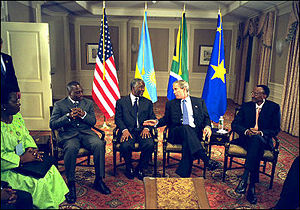 Image via Wikipedia
Image via WikipediaFirst Posted by ww.zimupdate.blogspot.com
So, Paul Kagame has won a resounding election in Rwanda, with something like over 90% of the vote. Under Kagame’s seven year leadership to date, Rwanda has transformed from a genocidal hell-hole into a peaceful, orderly, progressive country vying to become the “Singapore” of Africa. On the face of it, quite a success story; it’s been interesting to observe how much western support there for this success story. But there have been sporadic reports of violence, strange deaths among the opposition, media clampdowns and hints of other sinister goings-on.And the worse thing is, this seems to be depressingly familiar. How long before the West will begin to learn from their mistakes?
Don’t get me wrong, I visited Rwanda five years ago. It was a real eye opener. Several things struck me — how clean it was, how friendly, how peaceful and how rapidly it had progressed since the genocide ten years earlier.
But in my two week trip, some things disturbed me. For a start, there was the overwhelming compliance to the concept of public work days. I was there for work, during which two public work days were held, hence many of meetings were postponed or cancelled and I had to cancel my field trip. I was advised that if I absolutely had to work on those days, it would be best if I literally kept my head down in the hotel to do some work during that day and not to go out or I would be escorted to a public work site by the police and “invited” to join in. That sounded like coercion to me.
And yet, everyone thought this was good for Rwanda and a sign of progress and stability. I’m aware that part of my astonishment with this view is due the culture gap. After all, I’m a “whinging Pom”, who by definition grumbles when asked to comply with rules. We make jokes about the state being incompetent, how corrupt the system is, how misguided key policies are (especially those which don’t favour us of course) and so on. First, we grumble, then – generally – we comply.
Africans have long had the tradition of uncomplaining, faithful support for the Big Man, whether that’s the village chief, King or President. Africans respect strong leaders, and leaders traditionally show their strength through force. It is neither politic nor polite to voice your concerns, disagreements or to be disobedient.
So people comply. Rwanda itself provided us with a clear example of the extremes this can be taken to – through its genocide. People were stirred up by hate language on the radio, which extorted then to eradicate the minority ethnic group. The compliance level to this fanaticism resulted in 800,000 people being killed in three brutal months.
And what is the difference between being told to plant a tree, or dig wells, for the public good, and being told to kill your neighbours? A lot I hope, but, it’s the lack of discussion – and the unquestioning compliance to government edicts – that worries me. Well, that and increasing numbers of human rights violations.
Like Rwanda, It was not that long ago, that Zimbabwe was the darling of the West, a country lauded for its smooth transition into independence, and its thriving economy. The then Prime Minister Robert Mugabe was hailed by the West as a benevolent and wise leader who encouraged economic development in the spirit of reconciliation with former colonial powers. The West ignored reports of the Gukurahundi massacres (Zimbabwe’s genocide) which took place during the 1980s and broke the opposition through the deaths of an estimated 20,000 people from a different ethnic group. Since then, thousands of more people have disappeared, been illegally jailed, beaten or murdered.
How long did we wait, how long did things have to deteriorate before the West finally started to – tentatively – speak up? About 25 years, by which time Mugabe had amassed enough power, and amended the constitution enough times, to virtually guarantee that he would remain in charge of the nation for the rest of his life. Since then things have got a lot worse for the average Zimbabwean.
My fear is that the same could happen with Paul Kagame. I fervently hope that history proves me wrong. But in the meantime, Western diplomats, international policy makers and analysts, journalists, aid workers – learn from the mistakes of the past and keep your eyes and ears open. Don’t ignore or gloss over sporadic reports of human rights violations in Rwanda, Zimbabwe or in other countries. Be supportive but don’t foster the development of despotic tyrants. Western democratic models may not be the answer for Africa, but the continent has surely had its fill of oppression, authoritarian regimes and death.


No comments:
Post a Comment